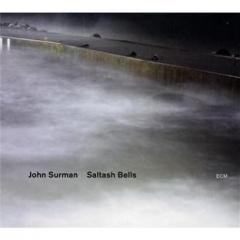Saltash Bells has become John Surman's most acclaimed album for years. In May 2013, almost a year after its release, the CD won another award - 'Album of the Year' at the 2013 Parliamentary Jazz Awards. This follows the same accolade in the inaugural Jazz FM Awards. It was also top of the annual Jazz Journal Critics Poll, and took a highly commendable third position in Jazzwise's 'Albums of the Year 2012'.
John Surman's solo albums occupy a special and important place in his discography. Saltash Bells is the first since 1994's A Biography of the Rev. Absalom Dawe, and it joins a line of distinguished recordings that begins with Westering Home (Island, 1972) and continues with the ECM albums Upon Reflection (1979), Withholding Pattern (1984), Private City (1987), and The Road To St Ives (1990). In the British reedman's multi-facetted music the solo recordings provide perhaps the clearest insights into his melodic imagination, and Saltash Bells ranks with the best of them.
This time around the compositions were inspired by the West Country of John's English childhood, memories of special places - and sounds. The title track refers to the echoes of bell ringing from Saltash church resounding around the Tamar River valley, at the border of Cornwall and Devon. 'Whistman's Wood', meanwhile, evokes the mysterious petrified forest of Dartmoor... And so it goes, ancient haunts inspiring vivid new music.
Saltash Bells re-emphasizes the uniqueness of Surman's solo work: here he plays soprano, tenor and baritone saxophones, alto, bass and contrabass clarinets, as well as harmonica and synthesizer. Surman has long used the synthesizer, in his solo works, as "a tool for sculpting texture and atmosphere, and for creating new contexts for improvisation which could be different from playing regular time with a bass player and drummer".
Nowhere else do his reeds stretch out quite as sensuously, with melodies that continue to unfold all the way to the horizon, the title track implying the clear days when you can see, and hear, forever. In the multi-tracked and delay-system pieces Surman finds an accord with the 'other players' which no real-time acoustic group music could duplicate. There is beautiful playing on each of his saxophones and clarinets and - listen closely to the backgrounds of 'Sailing Westwards' - some effective harmonica, too - a recorded debut for an instrument Surman has toyed with since his teens.
Personnel: John Surman (soprano, tenor and baritone saxophones; alto, bass and contrabass clarinets; harmonica, synthesizer)








